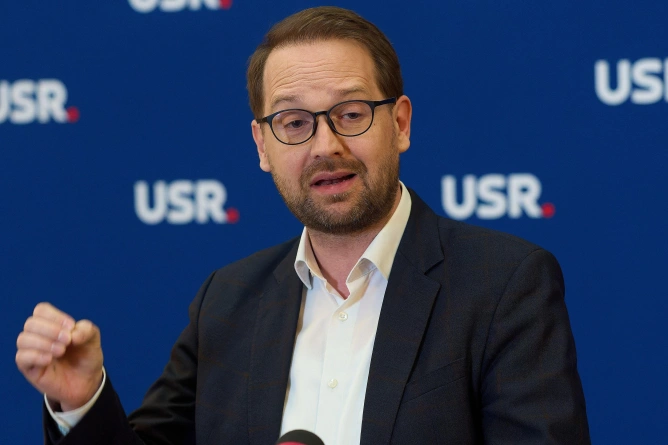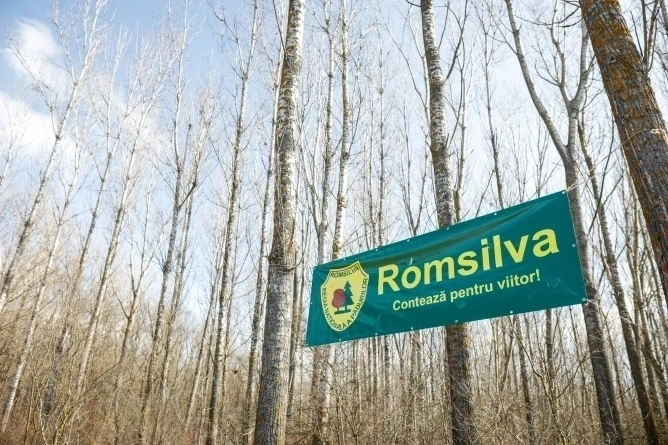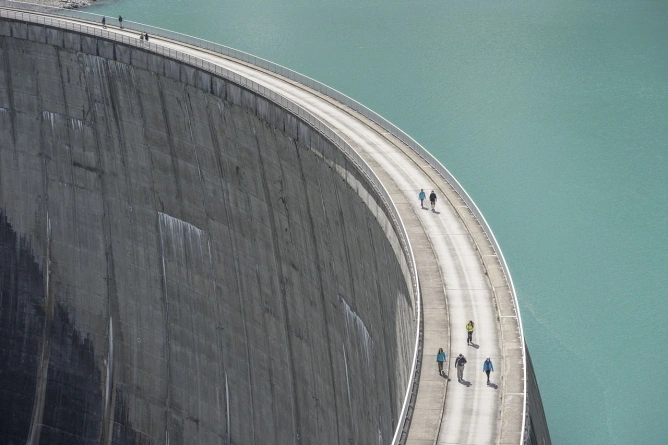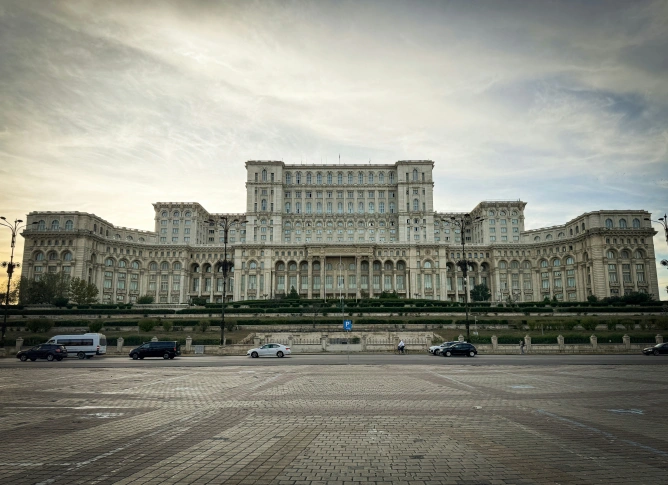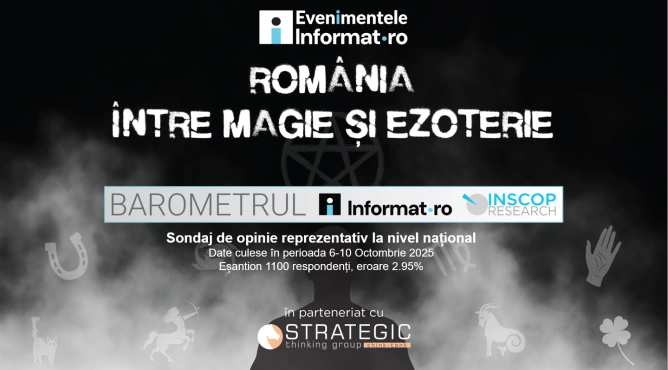
BAROMETER Informat.ro – INSCOP Research - "Romania Between Magic and Esotericism"
On Monday, October 20, the launch of the Barometer "Romania Between Magic and Esotericism" took place in the Media Hall at the Romanian Peasant Museum. The results of the sociological study were presented during a debate attended by Vasile BĂNESCU, CNA member, Vlad Petreanu, journalist, Darie Cristea, sociologist, associate dean of the Faculty of Sociology and Social Work at the University of Bucharest, Camelia BURGHELE, anthropologist, and Virgil NIȚULESCU, director of the Romanian Peasant Museum.
BAROMETER Informat.ro – INSCOP Research "Romania Between Magic and Esotericism" was conducted by INSCOP Research on behalf of the news platform Informat.ro in partnership with the Strategic Thinking Group think tank.
Methodology: Data was collected between October 6-10, 2025. Research method: interview via questionnaire. Data was collected using the CATI method (telephone interviews), with a simple stratified sample volume of 1100 people, representative of significant socio-demographic categories (gender, age, occupation) for the non-institutionalized population of Romania, aged 18 and over. The maximum allowable error of the data is ± 2.95%, at a confidence level of 95%.
Graphical presentation of the data is available here: BAROMETER Informat.ro – INSCOP Research - "Romania Between Magic and Esotericism"
Remus Ștefureac – director INSCOP Research: "The main conclusions drawn from the Barometer Informat.ro – INSCOP Research Romania Between Magic and Esotericism:
1. Despite accelerated modernization, and against the backdrop of parasitizing universal access to information, a significant segment of the population interprets the world through symbolic and magical filters. This likely indicates a syncretic mental structure, in which traditional religious belief coexists with forms of esoteric spirituality, providing individuals with a form of psychological control over daily uncertainty. Superstitions, beliefs in invisible energies or special abilities coexist with modern rationalism, illustrating a dual culture in which scientific explanations and symbolic-spiritual ones overlap, rather than exclude each other.
2. Although traditionally associated with the rural environment, these beliefs sometimes manifest more strongly in urban areas, where daily stress, competitive pressure, and social insecurity reactivate the need for meaning, protection, and control. Thus, the appeal to horoscopes, invisible energies, numerology, or alternative practices becomes, for part of the population, a modern form of magic adapted to the information society, a possible psychological substitute for institutional religiosity.
3. The results indicate a clear link between educational level and openness to scientific thinking. Individuals with lower education are more likely to accept spiritual or conspiratorial explanations, which signals worrying gaps and the fact that education fails to replace archaic cultural mechanisms of interpreting reality.
4. An explanation for adherence to superstitions and occult beliefs could be linked to a compensatory strategy of large segments of the population in the face of socio-economic insecurity. In the absence of stable institutional benchmarks, individuals resort to metaphysical explanations to make sense of unpredictable events and to restore a sense of predictability and order. Unfortunately, in the course of this process, large parts of the population become vulnerable to the most absurd conspiracies, some extremely dangerous, for example, for public health.
5. The manifestations of these beliefs in individual or community formulas are natural phenomena, with a long history, which we find in any society. However, the deliberate manipulation of this mystical and occult universe, spread across all social strata, for political purposes, influence, or for quick financial gain, by genuine professionals of exploiting others, represents a toxic phenomenon that severely erodes social cohesion and affects the collective capacity for discernment."
Superstitious people
17.6% of survey participants consider themselves to be superstitious. 12.1% say they probably are, 20.5% probably are not, while 46.5% definitely are not superstitious. The proportion of non-responses is 3.3%.
Superstitious people are mainly: PSD and AUR voters, men, individuals with primary education, residents of rural and small urban areas. Those who do not consider themselves superstitious are especially: USR voters, women, those with higher education.
Truth of superstitions
On the other hand, 41.6% of interviewees say they have had an experience in life where they observed that a superstition came true, while 55.5% say they have not. 2.9% do not know or do not respond.
They have had an experience in life where they observed that a superstition came true mainly: PSD voters, young people under 30, and those between 45 and 59 years old, individuals with primary education, residents of Bucharest. They have not had such an experience especially: USR voters, individuals over 60 years old.
Areas of superstition
31.1% of Romanians believe that it is best to take superstitions into account in health, 9.9% in love/relationships, 9.3% in career/getting a job, 8.7% in daily decisions, not a specific area, 7.7% in money, and 3.9% in exams, interviews, competitions. 6.5% do not know or do not respond.
PSD and AUR voters, individuals over 45 years old, those with primary education, and residents of rural areas consider to a greater extent than the rest of the population that superstitions should be taken into account in health. They believe that it is best to take superstitions into account in love/relationships especially: PNL and PSD voters, young people under 30.
They believe that it is best to take superstitions into account in career/getting a job especially: PNL and AUR voters, individuals with primary education, state employees. Young people under 30 and residents of large urban areas consider to a greater extent than the rest of the population that it is best to take superstitions into account in daily decisions, not a specific area. Especially PSD voters, young people under 30, and state employees believe that superstitions should be taken into account when it comes to money. They believe that it is best to take superstitions into account in exams, interviews, competitions especially: individuals with higher education, residents of Bucharest.
The importance of luck
75.3% of respondents believe that luck is important in life, while 21.4% disagree. The proportion of non-responses is 3.3%.
They consider that luck is important in life especially: PSD voters, men, residents of Bucharest. They do not believe that luck is important especially: USR voters, residents of small urban areas.
Changing luck
24.2% of participants believe that luck can be changed if certain superstitions are respected. 69.3% believe that luck cannot be changed, while 6.6% do not know or do not respond.
They believe that luck can be changed especially: AUR voters, men, individuals with primary education, residents of rural areas. They believe that luck cannot be changed especially: PNL and USR voters, women, individuals with higher education, residents of large urban areas, state employees.
Lucky number
30.9% of interviewees have a lucky or preferred number, while 68.5% do not have one. 0.6% do not know or do not respond.
They have a lucky or preferred number especially: AUR voters, young people under 30, residents of Bucharest. They do not have such a number especially: USR voters, individuals over 60 years old, state employees.
Superstition. Black cat
15.8% of Romanians believe that if a black cat crosses their path, it will bring them bad luck. 82.7% do not believe in this superstition, while 1.5% do not know or do not respond.
They believe in this superstition especially: AUR voters, young people under 30, individuals with primary education. They do not believe in this superstition especially: USR and PNL voters, individuals with higher education, residents of large urban areas, state employees.
Superstition. Passing under a ladder
3.7% of respondents believe that if they pass under a ladder, it will bring them bad luck, while 91.6% do not believe in this superstition. The proportion of non-responses is 4.7%.
No major variations exist based on the analyzed socio-demographic categories.
Superstition. Turning back
22.3% of survey participants believe that if they turn back, it will bring them bad luck. 76.4% do not agree, while 1.3% do not know or do not respond.
They believe in this superstition especially: PSD and AUR voters, individuals with primary education, residents of rural areas. They do not believe in this superstition especially: USR voters, individuals with secondary and higher education, residents of large urban areas, state employees.
Superstition. Tuesdays and Fridays the 13th
13% of those interviewed believe that Tuesdays or Fridays the 13th is an unlucky day. 84.7% do not believe in this superstition, while 2.3% do not know or do not respond.
They believe in this superstition especially: young people under 30, individuals with primary education, residents of Bucharest. They do not believe in this superstition especially: PNL voters, individuals with higher education, state employees.
Appeal to witches / sorceresses
6.4% of Romanians have turned to people considered "witches" or "sorceresses," while 93.5% say they have never done so. 0.1% do not know or do not respond.
They have turned to people considered "witches" or "sorceresses" especially: PSD voters, individuals with primary education. They have not turned to such people especially: USR voters, residents of Bucharest.
Horoscope and astrology
34.8% of respondents agree with the statement "Horoscopes and astrology can accurately predict personality traits or life events." 61% disagree, 4.1% do not know or cannot assess, while 0.1% do not respond.
They agree with the statement especially: PNL voters, young people under 30, individuals with primary education. They express disagreement especially: USR voters, individuals over 60 years old, those with higher education, residents of large urban areas, state employees.
Invisible energies
42.6% of participants agree with the statement "There are invisible energies (aura, chakras, bioenergy) that influence health," while 48.7% disagree. The proportion of non-responses is 8.7%.
They agree with the statement especially: AUR voters, individuals between 45 and 59 years old, residents of Bucharest. They express disagreement especially: PNL and USR voters, young people under 30.
"Energetically charged" places
The statement "There are "energetically charged" places in Romania" is agreed upon by 51.4% of those interviewed. 37.8% express disagreement, while 10.9% do not know or do not respond.
They agree with the statement especially: PSD voters, young people under 30. They express disagreement especially: PNL and USR voters.
Places with special energies
28.9% of Romanians believe that certain places like the Bucegi Mountains or Sarmisegetusa emanate special energies. 60% disagree, while 11.2% do not know or do not respond.
They believe that certain places like the Bucegi Mountains or Sarmisegetusa emanate special energies especially: AUR voters and young people under 30. PNL and USR voters, respectively individuals aged between 30 and 44 years believe at least in the existence of such places.
Special abilities
38.2% of Romanians agree with the statement "Certain people have special abilities (clairvoyance, telepathy, healing by touch)," while 55.7% disagree. 6.1% do not know or do not respond.
They agree with the statement especially: PNL and AUR voters, residents of Bucharest. They express disagreement especially: USR voters, individuals with higher education, residents of large urban areas.
Spirits and ghosts
21.2% of survey participants believe that "There are spirits or ghosts that can interact with our world." 71.2% disagree, while 7.6% do not know or do not respond.
They agree with the statement especially: young people under 30, residents of Bucharest. They express disagreement especially: USR voters, individuals between 45 and 59 years old.
Prophetic dreams
56% of those interviewed believe that "Dreams can predict real events," while 39.9% disagree. The proportion of non-responses is 4.1%.
They agree with the statement especially: AUR voters, young people under 30, individuals with primary education. They are against the statement especially: PNL and USR voters, individuals with higher education.
Alternative spiritual practices
5.5% of respondents have participated in alternative spiritual practices (e.g., numerology, tarot, reiki, yoga with esoteric emphasis), while 94.5% say they have not participated in such practices. There are no non-responses to this question.
They have participated in alternative spiritual practices especially: young people under 30, residents of Bucharest, individuals with higher education. They have not participated in such practices especially: PSD voters, individuals over 60 years old, those with primary education, residents of rural areas.
Conspiracies. Man on the Moon
The statement "People did not reach the Moon, it was all staged" is agreed upon by 26.1% of respondents. 64.9% express disagreement, 8.8% do not know or cannot assess, while 0.2% do not respond.
They agree with the statement especially: AUR voters, men, individuals with primary education, residents of rural areas, private sector employees. They express disagreement especially: PNL and USR voters, young people under 30, individuals with higher education, residents of large urban areas, state employees.
Conspiracies. Vaccines
40.1% of respondents agree with the statement "Vaccines are used to control the population," while 53.5% disagree. 6.3% do not know or cannot assess, while 0.1% do not respond.
They agree with the statement especially: AUR voters, individuals over 60 years old, those with primary education. They express disagreement especially: PNL and USR voters, young people under 30, individuals with higher education, residents of Bucharest and large urban areas.
Conspiracies. Aliens
The statement "Aliens have visited Earth and governments are hiding this" is agreed upon by 22.4% of respondents. 61.1% express disagreement, 16.3% do not know or cannot assess, while 0.3% do not respond.
They agree with the statement especially: PSD voters, individuals over 60 years old. They express disagreement especially: PNL and USR voters, young people under 30, individuals with higher education, residents of large urban areas.
Conspiracies. Secret external control over Romania
61.4% of survey participants believe that "Romania is a country where external powers secretly control important decisions." 30.6% disagree with this statement, 7.6% do not know or cannot assess, while 0.3% do not respond.
They agree with the statement especially: PSD and AUR voters, individuals with primary education. They express disagreement especially: PNL and USR voters, young people under 30, individuals with higher education, residents of Bucharest and large urban areas.
Conspiracies. Manipulating the population through technologies
55.6% of respondents agree with the statement "Modern technologies (5G, artificial intelligence) are used to manipulate the population." 37.9% express disagreement, 6.3% do not know or cannot assess, while 0.2% do not respond.
They agree with the statement especially: PSD and AUR voters, individuals over 60 years old, those with primary education. They express disagreement especially: USR voters, individuals with higher education, residents of Bucharest.
Conspiracies. Secret power groups causing pandemics and economic crises
58.4% of those interviewed believe that "Pandemics or economic crises are the result of plans by secret power groups," while 34.1% disagree. 7.3% do not know or cannot assess, while 0.2% do not respond.
They agree with the statement especially: AUR voters, individuals with primary education, residents of rural areas. They express disagreement especially: PNL and USR voters, young people under 30, individuals with higher education, residents of Bucharest.
Effectiveness of alternative medicine vs. modern medicine
23.7% of respondents are more likely to agree with the statement: "Alternative medicine (e.g., plants, bioenergy) is more effective than modern medicine." 64.8% choose the statement: "Modern medicine is more effective than alternative medicine (e.g., plants, bioenergy)." 10.9% do not know or cannot assess, while 0.6% do not respond.
They agree with the statement "Alternative medicine (e.g., plants, bioenergy) is more effective than modern medicine" especially: AUR voters, individuals with primary education. They choose the statement "Modern medicine is more effective than alternative medicine (e.g., plants, bioenergy)" especially: PNL and USR voters, individuals with higher education, residents of large urban areas.
Reason and science vs. Belief and tradition
50.8% of Romanians rely more on reason and science when making an important decision, while 43.8% rely on belief and tradition. The proportion of non-responses is 5.4%.
They choose reason and science when making an important decision especially: PNL and USR voters, young people under 30, individuals with higher education, residents of Bucharest and large urban areas. They rely on belief and tradition especially: PSD and AUR voters, individuals over 60 years old, those with primary education, residents of rural areas.
The importance of religious belief and scientific explanations
For 33% of participants, "Religious belief is more important than scientific explanations." 15.6% believe that "Scientific explanations are more important than religious belief." 50.1% choose the option "Religious belief and scientific explanations are equally important." The proportion of non-responses is 1.2%.
They choose the statement "Religious belief is more important than scientific explanations" especially: PSD and AUR voters, individuals with primary education, residents of rural areas.
They are of the opinion that "Scientific explanations are more important than religious belief" especially: PNL and USR voters, young people under 30, individuals with higher education, residents of Bucharest and large urban areas. Individuals with secondary education, residents of small urban areas, and state employees choose the statement "Religious belief and scientific explanations are equally important" more than the rest of the population.
Willingness for alternative spiritual practices
If a close person would recommend them, 7.1% of respondents would be willing to try practices such as energies, spells, appeals to numerology, and fortune-telling. 92.1% would not try such alternative spiritual practices, 0.5% do not know or cannot assess, and 0.2% do not respond.
They would be willing to try alternative spiritual practices especially: USR voters, young people under 30, individuals with higher education, residents of Bucharest. They would not be willing to try such practices especially: PSD voters, individuals over 60 years old.
The event can be followed live by accessing this link.






